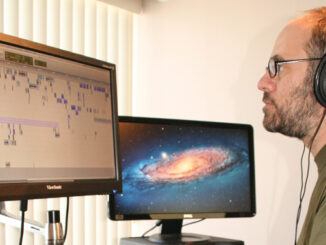
by Mel Lambert
Having retired after 45 years in the business, Don Hall, was asked to join the University of Southern California’s School of Cinema. “After I retired in January 1996, my wife Teddy and I started to do all the things retired people do,” Hall remembers. “And then I got a call from a friend, Jimmy Nelson, who said, ‘I’ve been asked to teach a course at USC, but you are the person who should be doing it.’ I went down for one semester, without any idea of what I was going to teach. I was given a syllabus and struggled through the first semester because, at the time, I didn’t have any materials––but it went great. Probably, those first two to three classes were some of my best classes; I just fell in love with being able to pass on what I knew.” Hall is now a senior lecturer and interim track head for Sound.
“Our students want to know about the film business and love it when we bring in people from the industry,” he explains. “Students love to meet people working in the field, and my activities in the Academy help to bolster that qualification, as does my body of sound work.”
According to Hall, he shapes whatever he is teaching around the thinking process. “Technology changes––you can learn new tools––but you have to have a concept, and know the sound track you want to create,” he says. “Can you teach creativity? No, you cannot, according to an article I read. If you are both creative and technically inclined, you can shape sound to whatever you hear it in your mind. If you don’t possess both skills, it needn’t be a problem. I see students who are strong in the creative process but weak with the technology, and vice versa. They should be encouraged to go with their strengths, because filmmaking is a collaborative process and we rely on each other.
“We don’t advertise that we have a sound department,” he continues. “Every student comes to the USC film school to be a director or a writer. When they are exposed to all the media we teach, they may say, ‘I love doing something else.’ Some of them focus on sound; I mentor the students working toward a MFA in Sound Design. I’ve had students go in that direction, earning their degrees by designing the sound on challenging thesis films.”
“It deepens their understanding, broadens their outlook and widens their perspective on life.” – Don Hall
Hall also believes in teaching by example. “My courses are often based on older films––many that I’ve worked on––to show the students that there is really nothing new,” he stresses. “But I reinforce that by showing recent films using the same concept or technique to validate the point. If the concept worked in earlier films, why not in yours?”
He also emphasizes sound consciousness. “Most students are not aware of the sounds in their surrounding environment; to survive, we tune them out,” he explains. “During the first weeks of classes, I teach the students to re-learn the art of listening and to build a sound track of every- thing that goes into a scene––by subtraction, manipulation and selection––using only the sounds that help tell the story.
“I never discourage my students from trying to succeed,” Hall is quick to add. “Those that have the talent, the will and the ambition will surface to the top. So much of their success is based on luck; where they are and what they are doing. As I always tell them, even if a position is poorly paid, it is easier to find a job when you are working. I also tell them not to make all of their friends from within the industry; they need a balance.”
Despite the currently bleak employment outlook in the country, why does Hall feel it’s a good time to be graduating from USC or other recognized film schools? “Because filmmakers are looking for people who have a rounded education,” he states. “It deepens their understanding, broadens their outlook and widens their perspective on life.
“I also advise them to not become discouraged with disappointments they may have early in their careers,” he concludes. “It’s a great industry!”






